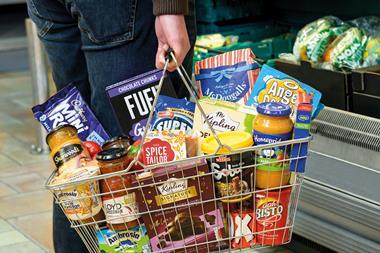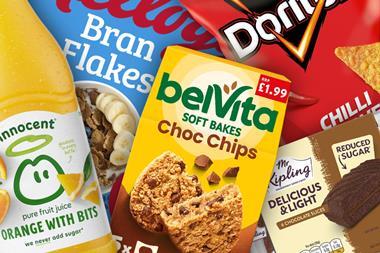Robert Schofield is convinced he’s nurturing some of the UK’s best. Mary Carmichael reports
Premier Foods CEO Robert Schofield likens himself to Chelsea FC owner Roman Abramovich in his search for star players to take his company forward. “I want to buy in at the Chelsea level,” he says. “I want the players who can deliver now, not the 17-year-old who’s going to be brilliant in five years. We have to renovate and we have to get people who can do it now.”
Of course, Schofield’s star players are signed to Premier Foods rather than a premier league football team. And they’re not international superstars but “classic British brands that other people don’t see any value in”.
However, he believes the veterans, alongside a few fresh signings, will take the team to the top of the league.
The Premier Foods squad includes Branston Pickle, Smash, Hartley’s jam, Marvel dried milk, Sun-Pat peanut butter and Typhoo tea. There are a few newer stars - most notably the Loyd Grossman collection of sauces, soups and dressings, which Schofield says is growing at more than 40% year-on-year. But the most recent acquisition, Ambrosia, which was bought from Unilever Bestfoods in November 2003, continues the tried and trusted approach.
Schofield explains: “We are interested in brands we feel have been neglected - getting behind them to innovate, which the big food companies probably wouldn’t do because these brands would be so far down their pecking order. They’ve a lot of heritage and they need a bit of TLC.”
Schofield promises “innovation in spades” for Ambrosia before the end of the year and says the brand will be integrated seamlessly into Premier Foods’ marketing programme.
Parent company Hicks, Muse, Tate & Furst is also set to complete its deal for the UK’s bestselling breakfast cereal brand Weetabix for £642m later this month but, although this could provide considerable ‘breakfast’ synergy with Premier Foods’ portfolio, it will be run separately.
Schofield, who hails from Macclesfield in Cheshire, began his career with United Biscuits. His second stop was Nestlé and he worked in the Far East for eight years before returning to the UK and UB in 1986, ultimately becoming MD of McVitie’s. When UB sold, he moved to Premier Foods. The company was still restructuring when Schofield joined as MD in 2001 - he was made chief executive officer in January 2002 - and he oversaw a move from Cambridgeshire to St Albans. “My first job was to consolidate the businesses,” he explains. “I had to make a lot of people changes to switch the mentality from a trading company to a marketing company - you can’t do that with the same animal.”
The need to cull and change staff has recurred in much of Schofield’s working life. Sometimes it is necessary to make tough calls, he says unapologetically. “People would say I’m demanding and hands-on,” he admits. “But if you want to do things at pace, you’ve got to pull your finger out. I do it, I expect everyone else to do it.”
He is not, however, above admitting to the occasional learning experience. At McVitie’s, he had a bee in his bonnet about vending, he says. “I was convinced that anything that happens in the US happens here eventually. I was pushing it for two years even though others were saying we were not set up to it. They were right.”
However, his successes have outweighed any hiccups. It helps that Premier Foods’ focus is predominantly British, he believes. “We’re worth £1bn, we’re very big in the UK and we have 11 number one brands,” he says. “But we’re nimble enough to make rapid decisions.”
Recent acquisitions signal the company’s move further into branded goods, with the ratio to own label at 60:40. Own label remains important, though.
Says Schofield: “We are leveraging our scale to make our cost base so competitive that we can offer value to own label and category solutions.”
As far as manufacturers’ relationships with retailers goes, he has little nostalgia for the good old days and says it is up to manufacturers to take control of ailing fixtures. “Selling these days is about money and understanding the category,” he says. “We must learn to sell more from less space.
“The new environment pioneers innovation all the time - we can either get beaten around the head because we’re not doing what retailers want or we can accept this is the way of the world and get on with it.”
At 51, Schofield’s current role probably won’t be his last. But although HMTF is likely to sell Premier Foods eventually, life at a conglomerate doesn’t appeal. “I wouldn’t be able to repeat the latitude I have now,” he explains.
Schofield - man of action - loves what he’s doing now. “We’re dynamic, we’re buying things, we’re doing things.”
Premier Foods CEO Robert Schofield likens himself to Chelsea FC owner Roman Abramovich in his search for star players to take his company forward. “I want to buy in at the Chelsea level,” he says. “I want the players who can deliver now, not the 17-year-old who’s going to be brilliant in five years. We have to renovate and we have to get people who can do it now.”
Of course, Schofield’s star players are signed to Premier Foods rather than a premier league football team. And they’re not international superstars but “classic British brands that other people don’t see any value in”.
However, he believes the veterans, alongside a few fresh signings, will take the team to the top of the league.
The Premier Foods squad includes Branston Pickle, Smash, Hartley’s jam, Marvel dried milk, Sun-Pat peanut butter and Typhoo tea. There are a few newer stars - most notably the Loyd Grossman collection of sauces, soups and dressings, which Schofield says is growing at more than 40% year-on-year. But the most recent acquisition, Ambrosia, which was bought from Unilever Bestfoods in November 2003, continues the tried and trusted approach.
Schofield explains: “We are interested in brands we feel have been neglected - getting behind them to innovate, which the big food companies probably wouldn’t do because these brands would be so far down their pecking order. They’ve a lot of heritage and they need a bit of TLC.”
Schofield promises “innovation in spades” for Ambrosia before the end of the year and says the brand will be integrated seamlessly into Premier Foods’ marketing programme.
Parent company Hicks, Muse, Tate & Furst is also set to complete its deal for the UK’s bestselling breakfast cereal brand Weetabix for £642m later this month but, although this could provide considerable ‘breakfast’ synergy with Premier Foods’ portfolio, it will be run separately.
Schofield, who hails from Macclesfield in Cheshire, began his career with United Biscuits. His second stop was Nestlé and he worked in the Far East for eight years before returning to the UK and UB in 1986, ultimately becoming MD of McVitie’s. When UB sold, he moved to Premier Foods. The company was still restructuring when Schofield joined as MD in 2001 - he was made chief executive officer in January 2002 - and he oversaw a move from Cambridgeshire to St Albans. “My first job was to consolidate the businesses,” he explains. “I had to make a lot of people changes to switch the mentality from a trading company to a marketing company - you can’t do that with the same animal.”
The need to cull and change staff has recurred in much of Schofield’s working life. Sometimes it is necessary to make tough calls, he says unapologetically. “People would say I’m demanding and hands-on,” he admits. “But if you want to do things at pace, you’ve got to pull your finger out. I do it, I expect everyone else to do it.”
He is not, however, above admitting to the occasional learning experience. At McVitie’s, he had a bee in his bonnet about vending, he says. “I was convinced that anything that happens in the US happens here eventually. I was pushing it for two years even though others were saying we were not set up to it. They were right.”
However, his successes have outweighed any hiccups. It helps that Premier Foods’ focus is predominantly British, he believes. “We’re worth £1bn, we’re very big in the UK and we have 11 number one brands,” he says. “But we’re nimble enough to make rapid decisions.”
Recent acquisitions signal the company’s move further into branded goods, with the ratio to own label at 60:40. Own label remains important, though.
Says Schofield: “We are leveraging our scale to make our cost base so competitive that we can offer value to own label and category solutions.”
As far as manufacturers’ relationships with retailers goes, he has little nostalgia for the good old days and says it is up to manufacturers to take control of ailing fixtures. “Selling these days is about money and understanding the category,” he says. “We must learn to sell more from less space.
“The new environment pioneers innovation all the time - we can either get beaten around the head because we’re not doing what retailers want or we can accept this is the way of the world and get on with it.”
At 51, Schofield’s current role probably won’t be his last. But although HMTF is likely to sell Premier Foods eventually, life at a conglomerate doesn’t appeal. “I wouldn’t be able to repeat the latitude I have now,” he explains.
Schofield - man of action - loves what he’s doing now. “We’re dynamic, we’re buying things, we’re doing things.”


















No comments yet